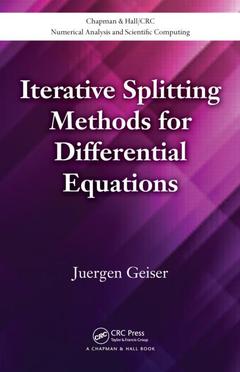Description
Iterative Splitting Methods for Differential Equations
Chapman & Hall/CRC Numerical Analysis and Scientific Computing Series
Author: Geiser Juergen
Language: English
Subjects for Iterative Splitting Methods for Differential Equations:
Keywords
Iterative Splitting Method; Splitting Methods; iterative splitting methods; Iterative Splitting; decomposition methods; Operator Splitting Method; ordinary differential equations; Splitting Scheme; partial differential equations; Iterative Steps; spatial-dependent differential equations; ADI Method; time-dependent differential equations; CFL Condition; evolution equations; LOD Method; parabolic equations; Iterative Schemes; hyperbolic equations; Multiphysics Problems; convection-diffusion-reaction equations; Burgers Equation; heat equations; Splitting Error; wave equations; UG; RK Method; multiscale problems; Time Discretization Schemes; CFL; Unbounded Operators; Err1 Err2; Spatial Discretization Schemes; Iteration Steps; Viscous Stresses; IOS; CVD Apparatus; Time Discretization Methods
Publication date: 06-2011
Support: Print on demand
Approximative price 87.11 €
In Print (Delivery period: 14 days).
Add to cartPublication date: 05-2017
· 15.6x23.4 cm · Paperback
Description
/li>Contents
/li>Readership
/li>Biography
/li>
Iterative Splitting Methods for Differential Equations explains how to solve evolution equations via novel iterative-based splitting methods that efficiently use computational and memory resources. It focuses on systems of parabolic and hyperbolic equations, including convection-diffusion-reaction equations, heat equations, and wave equations.
In the theoretical part of the book, the author discusses the main theorems and results of the stability and consistency analysis for ordinary differential equations. He then presents extensions of the iterative splitting methods to partial differential equations and spatial- and time-dependent differential equations.
The practical part of the text applies the methods to benchmark and real-life problems, such as waste disposal, elastics wave propagation, and complex flow phenomena. The book also examines the benefits of equation decomposition. It concludes with a discussion on several useful software packages, including r3t and FIDOS.
Covering a wide range of theoretical and practical issues in multiphysics and multiscale problems, this book explores the benefits of using iterative splitting schemes to solve physical problems. It illustrates how iterative operator splitting methods are excellent decomposition methods for obtaining higher-order accuracy.
Introduction. Model Problems. Iterative Decomposition of Ordinary Differential Equations. Decomposition Methods for Partial Differential Equations. Computation of the Iterative Splitting Methods: Algorithmic Part. Extensions of Iterative Splitting Schemes. Numerical Experiments. Summary and Perspectives. Software Tools. Appendix. Bibliography. Index.
Juergen Geiser is a researcher in the Department of Mathematics at the Humboldt-University of Berlin. His research interests include numerical and computational analysis, partial differential equations, decomposition and discretization methods for hyperbolic and parabolic equations, optimization, scientific computing, and interface analysis.




